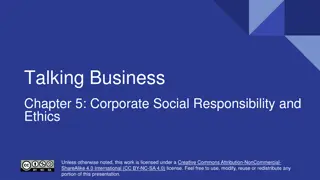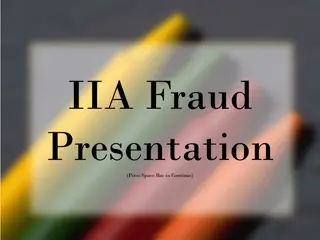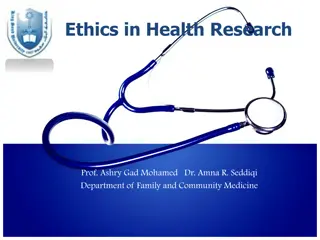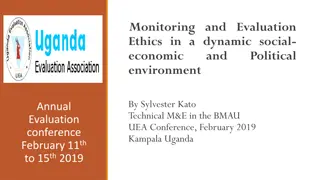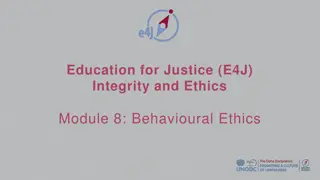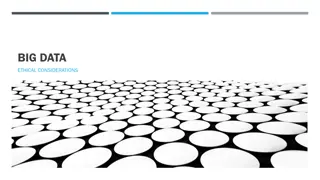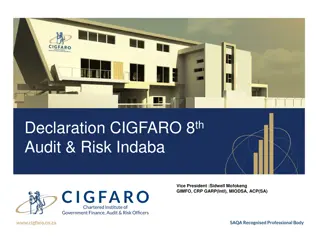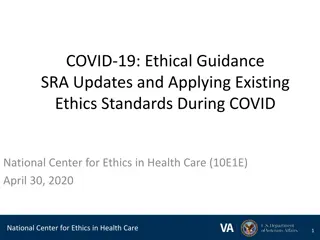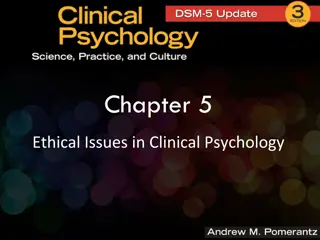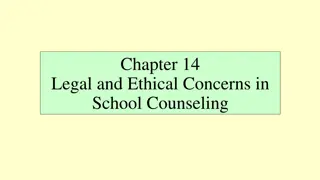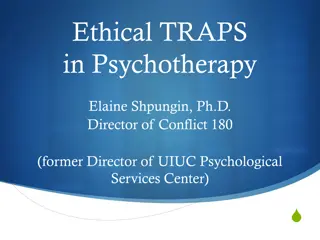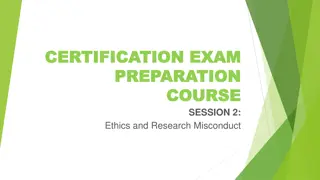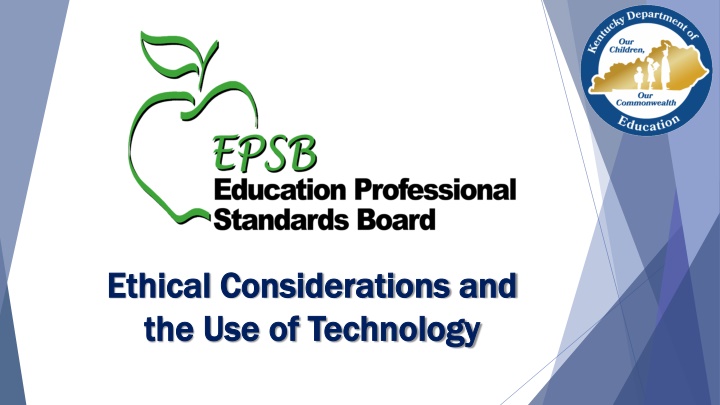
Ethical Considerations in Education & EPSB Standards
Ethical considerations in education, EPSB's role in maintaining teaching standards, disciplinary actions for misconduct, and the Professional Code of Ethics for Kentucky educators.
Download Presentation

Please find below an Image/Link to download the presentation.
The content on the website is provided AS IS for your information and personal use only. It may not be sold, licensed, or shared on other websites without obtaining consent from the author. If you encounter any issues during the download, it is possible that the publisher has removed the file from their server.
You are allowed to download the files provided on this website for personal or commercial use, subject to the condition that they are used lawfully. All files are the property of their respective owners.
The content on the website is provided AS IS for your information and personal use only. It may not be sold, licensed, or shared on other websites without obtaining consent from the author.
E N D
Presentation Transcript
Ethical Considerations and Ethical Considerations and the Use of Technology the Use of Technology
What is the EPSB? The Education Professional Standards Board has the authority and responsibility to establish standards and requirements for obtaining and maintaining a teaching certificate. KRS 161.028(1)(a). 2
EPSBs Disciplinary Authority The EPSB may take action against a certificate for any misconduct described in KRS 161.120(1) including violations of the Professional Code of Ethics for Kentucky Certified School Personnel. This process is independent of the district s disciplinary and the tribunal process described in KRS 161.790. 3
Misconduct under KRS 161.120: Convictions for felonies, certain misdemeanors, and any misdemeanor involving a student or minor; Having sexual contact with a student or a minor; Committing any act that constitutes fraudulent, corrupt, dishonest, or immoral conduct; Demonstrating willful or careless disregard for the health, welfare, or safety of others; Physical or mental incapacity that prevents the educator from performing duties with reasonable skill, competence, or safety; Possessing, using, or being under the influence of alcohol, which impairs the performance of duties; Unlawfully possessing or unlawfully using a drug during the performance of duties; h) Incompetency or neglect of duty; i) Falsifying information in an effort to obtain or renew a certificate; j) Failing to report misconduct; k) Failing to comply with an order of the EPSB; l) Violating any state statute relating to schools or the teaching profession; m) Violating the Professional Code of Ethics; n) Violating any administrative regulation promulgated by the EPSB or KDE; or o) Discipline from another licensing or certifying jurisdiction on grounds that constitute a violation in Kentucky a) b) c) d) e) f) g) 4
Professional Code of Ethics for Kentucky Certified School Personnel 5
Separated into three categories of Responsibilities To Students To Parents To the Education Profession 6
TO STUDENTS Shall provide students with professional education services in a nondiscriminatory manner and in consonance with accepted best practice known to the educator. 1. Shall respect the constitutional rights of all students. 2. Shall take reasonable measures to protect the health, safety, and emotional well- being of students. 3. Shall not use professional relationships or authority with students for personal advantage. 4. Shall keep in confidence information about students which has been obtained in the course of professional service, unless disclosure serves professional purposes or is required by law. 5. Shall not knowingly make false or malicious statements about students or colleagues. 6. Shall refrain from subjecting students to embarrassment or disparagement. 7. Shall not engage in any sexually related behavior with a student with or without consent, but shall maintain a professional approach with students. Sexually related behavior shall include such behaviors as sexual jokes; sexual remarks; sexual kidding or teasing; sexual innuendo; pressure for dates or sexual favors; inappropriate physical touching, kissing, grabbing; rape; threats of physical harm; and sexual assault. 8. 7
TO PARENTS Shall make reasonable effort to communicate to parents information which should be revealed in the interest of the student. 1. Shall endeavor to understand community cultures and diverse home environments of students. 2. Shall not knowingly distort or misrepresent facts concerning educational issues. 3. Shall distinguish between personal views and the views of the employing educational agency. 4. Shall not interfere in the exercise of political and citizenship rights and responsibilities of others. 5. Shall not use institutional privileges for private gain, for the promotion of political candidates, or for partisan political activities. 6. Shall not accept gratuities, gifts, or favors that might impair or appear to impair professional judgment, and shall not offer any of these to obtain special advantage. 7. 8
TO THE EDUCATION PROFESSION Shall exemplify behaviors which maintain the dignity and integrity of the profession. 1. Shall accord just and equitable treatment to all members of the profession in the exercise of their professional rights and responsibilities. 2. Shall keep in confidence information acquired about colleagues in the course of employment, unless disclosure serves professional purposes or is required by law. 3. Shall not use coercive means or give special treatment in order to influence professional decisions. 4. Shall apply for, accept, offer or assign a position or responsibility only on the basis of professional preparation and legal qualifications. 5. Shall not knowingly falsify or misrepresent records of facts relating to the educator s own qualifications or those of other professionals. 6. 9
The New Digital World As technology has advanced, so has the use of technology to violate the Code of Ethics. The Code of Ethics applies to educators in both the real world and the digital world.
Technology and Violations Inappropriate Relationship with Students Sexual Harassment Breach of Confidentiality Failure to Maintain the Dignity and Integrity of the Profession Neglect of Duty 11
Precautions and Solutions Cybertraps for Educators Cybertraps for Educators by Frederick S. Lane by Frederick S. Lane 12
Tips From Fred Students are NOT your friends Be mindful Be transparent Be a role model for good online behavior 13
You Are Being Watched Every electronic communication is a record Your privacy settings are not a fail safe If your grandma, boss, or preacher saw your post would they have a problem with it? Know and follow your district s social media policies 14
Remote Learning and NTI 15
Non-Traditional Instruction (NTI) Expectations When NTI is called for, teachers must remember the following: Ensuring accessibility for all students for which the learning is intended and responsiveness to diverse learning groups Maintaining consistent communication between instructional staff, students and families Addressing the curricular and instructional needs associated with appropriate grade-level, content-area standards Demonstrating evidence of authentic student learning Considering the whole child as well as the home learning environment Make sure to follow your district s approved NTI plan 16
Remote Learning - Security Privacy breaches, both intentional and accidental, are easier in a remote learning environment. Review your district s policies re: technology (student privacy guidelines, who can use your devices, social media postings, waivers, etc.) Be careful not to disclose information from educational records in the virtual classroom. Be cautious with district communication. If ANYTHING looks suspicious (lack of signature, strange sender email address, etc.), contact district IT ASAP. Never provide your passwords to someone via email, and consider two-factor authentication methods. 17
Remote Learning Communication Teaching online is very different from a standard classroom, but your ethical obligations are the same: efficient learning, quality learning, and guidance. Learn how to control the functionality of the software your district is using. Consider having cameras and microphones default to off for all participants Set up so students cannot enter the virtual classroom until the teacher does to minimize distracting conversations Remind students not to take their device into personal spaces such as bathrooms. Set up clear communication channels and allow for those channels to be closed at the end of the instructional day. 18
Remote Learning Positive and Ethical Environment When teaching remotely, it is also crucial to remember privacy and proper boundaries as if in a physical classroom. The lax environment of remote work can lead to lapses in judgment, and potentially blur the lines between teacher, student, and friend. Always remember: students are your charges and your responsibility first. Emphasize school-endorsed communication platforms rather than personal ones. Administration and parents should have access to all communication between teacher and student. 19
Remote Learning Positive and Ethical Environment The use of a web camera brings up a myriad of privacy concerns. It can be seen as invasive, it can reveal elements of a person s home life that should not be shared, and transparency is key. Always wear proper attire when using your webcam. If you would not wear it to work, you should not wear it on video chat. Make sure you are in a proper environment for webcasting. Professionalism is key, and a tidy, organized workspace broadcasts the image of a professional and ethical educator. 20
Remote Learning Abuse and Neglect Remember that you still have a duty to report abuse and neglect. If you encounter something in your students home life as a result of remote work that leads you to believe your student is being abused or neglected, inform the proper authorities. KRS 620.030(1) - Any person who knows or has reasonable cause to believe that a child is dependent, neglected, or abused shall immediately cause an oral or written report to be made to a local law enforcement agency or to the Department of Kentucky State Police, the cabinet or its designated representative, the Commonwealth's attorney, or the county attorney by telephone or otherwise. 21
Remote Learning Well-being of Teachers and Students Remember: you are a teacher, but not a counselor or therapist. Students may wish to rely on you for emotional and personal guidance as their contact with others may be limited. You MUST refer these situations to the proper district professionals! Take care of yourself. If your own emotions and mental state are stable and well managed, this will encourage proper and ethical communication from your end as well. Take a break from watching, reading or listening to news stories Unplug (from email, phone calls, social media) for certain periods of time throughout the day Stay in contact with those you care about through virtual platforms 22
National Association of State Directors of Teacher Education and Certification https://www.nasdtec.net/page/MCEE_Doc 23
What is the MCEE? The MCEE serves as a guide for future & current educators faced with the complexities of P-12 education. The code establishes principles for ethical best practice, mindfulness, self-reflection, and decision-making, setting the groundwork for self-regulation & self-accountability. The establishment of this professional code of ethics, by educators and for educators, honors the public trust and upholds the dignity of the profession. 24
The Board views the MCEE as a complimentary document to the Professional Code of Ethics for Kentucky Certified School Personnel (16 KAR 1:020). The Professional Code of Ethics lists what an educator shall shall not shall not do, but the MCEE provides an educator with an ethical decision-making framework. shall and The MCEE is especially useful for navigating the world of technology in teaching, with a section specifically dedicated to the topic. 25
MCEE Principles Responsible Use The professional educator uses technology in a responsible manner by: Using social media responsibly, transparently, and primarily for purposes of teaching and learning per school and district policy. The professional educator considers the ramifications of using social media and direct communication via technology on one s interactions with students, colleagues, and the general public Staying abreast of current trends and uses of school technology Promoting the benefits of and clarifying the limitations of various appropriate technological applications with colleagues, appropriate school personnel, parents, and community members Knowing how to access, document and use proprietary materials and understanding how to recognize and prevent plagiarism by students and educators Understanding and abiding by the district s policy on the use of technology and communication Recognizing that some electronic communications are records under the Freedom of Information Act (FOIA) and state public access laws and should consider the implications of sharing sensitive information electronically either via professional or personal devices/accounts Exercising prudence in maintaining separate and professional virtual profiles, keeping personal and professional lives distinct. 26
MCEE Principles Student Safety The professional educator ensures students safety and well-being when using technology by: Being vigilant in identifying, addressing and reporting (when appropriate and in accordance with local district, state, and federal policy) inappropriate and illegal materials/images in electronic or other forms Respecting the privacy of students presence on social media unless given consent to view such information or if there is a possibility of evidence of a risk of harm to the student or others Monitoring to the extent practical and appropriately reporting information concerning possible cyber bullying incidents and their potential impact on the student learning environment 27
MCEE Principles - Confidentiality The professional educator maintains confidentiality in the use of technology by: Taking appropriate and reasonable measures to maintain confidentiality of student information and educational records stored or transmitted through the use of electronic or computer technology Understanding the intent of Federal Educational Rights to Privacy Act (FERPA) and how it applies to sharing electronic student records Ensuring that the rights of third parties, including the right of privacy, are not violated via the use of technologies 28
MCEE Principles Appropriate Use The professional educator promotes the appropriate use of technology in educational settings by: Advocating for equal access to technology for all students, especially those historically underserved Promoting the benefits of and clarifying the limitations of various appropriate technological applications with colleagues, appropriate school personnel, parents, and community members Promoting technological applications (a) that are appropriate for students individual needs, (b) that students understand how to use and (c) that assist and enhance the teaching and learning process 29
Questions? Contact Information: Educator Ethics 300 Sower Blvd., 5th Floor Frankfort, Kentucky 40601 502-564-4606 www.epsb.ky.gov Staff email addresses: Chelsea.Young@education.ky.gov Luke.Gilbert@education.ky.gov Norah.Softic@education.ky.gov Breanna.Listermann@education.ky.gov Leah.Sharpe@education.ky.gov Casandra.Rosa-Burgos@education.ky.gov 30

